In March, we released a survey asking add-on developers which APIs they need to transition successfully to WebExtensions. So far, 235 people have responded, and we’ve summarized some of the findings in these slides.
Developers with the most add-ons responded at a disproportionate rate. Those with 7 or more add-ons represent 2% of the add-on developer community, and those with 4-6 add-ons represent 3%, but they comprised 36.2% of survey respondents. This didn’t come as a surprise, since the most active developers are also the most engaged and have the most to gain by migrating to WebExtensions.
Nearly half of respondents have tried implementing their add-ons in Chrome, and the most cited limitation is that it’s restrictive. Developers could not do much with the UI other than add buttons or content tabs. We intend to offer APIs that give developers more freedom to customize their add-ons, and these results tell us we’re on the right track.
In the coming months, we’ll draw on these results to inform our decisions and priorities, to ensure WebExtensions lives up to it promise…and goes beyond.


Ben Bucksch wrote on
wrote on
Joe wrote on
wrote on
Amy Tsay wrote on
wrote on
Ulf3000 wrote on
wrote on
Jorge Villalobos wrote on
wrote on
Brett Zamir wrote on
wrote on
Erik wrote on
wrote on
user wrote on
wrote on